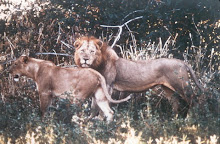There is no best season to come on safari as each season brings its own delights. There are different aspects to every month of the year:
• The green season (November – March) is the most spectacular time for birdwatching, with all the migrants arriving to breed and displaying their bright plumage and intricate song.
• The month of May is the busiest month as it is the impala's rutting season. The bush is now full of the snorts and grunts of male impala that busy themselves either seeing off the competition or trying to impress the females.
• As the bush dries rapidly, stark changes take place over the next few months. The lagoons, already separate from the river in most cases, slowly dry up and disappear. Large herds of buffalo, elephant and other animals gather at the river's edge to take advantage of the permanent supply of water and one gets the feeling that everything is leading inexorably towards the onset of the rains once more.
Although the Luangwa and our company in particular are famous for walking safaris, we like to offer variety to all our guests. You will always have the choice between walking and driving but we strongly recommend a combination of both.
Driving Safaris
Most of our safari vehicles have only two rows of seats and we prefer not to put more than four guests in a vehicle. We do have a larger vehicle for families and small groups but we like to ensure that everyone has a window seat - not that our vehicles have windows of course - in Zambia we are lucky to be allowed completely open vehicles in our National Parks enabling you to be as close as ever to the animals you are watching.
Game drives generally take place just after sunrise and around sunset. You will follow the loop roads in the park, stopping to view wildlife and for the quides to offer you their observations. Morning safaris will include a stop for tea or coffee. You will return to camp at around 10am. Evening safaris will include a stop at sunset for Sundowners – aperatifs served by your guide. The safari will then continue after nightfall viewing nocturnal wildlife, and returning to camp in time for dinner.
Walking safaris
Norman always maintained that to view the bush from a vehicle was to observe, but to get out on foot was to become instantly a part of your surroundings. Anyone experiencing a walking safari will concur that to stand and see the flick of a lion's tail as he disappears behind a bush 100 yards away, incensed and mystified by your presence, is infinitely more exciting than to sit in the safety of a jeep within inches of the same creature.
Zambia’s Luangwa Valley is regarded as the home of walking safaris. In recent years many private reserves and National Parks across Africa have caught on to the trend but nowhere yet comes close. The level of training required before qualifying as a walking guide and the concept of an armed escort as well as the naturalist guide leading each walk, mean that the emphasis in the Luangwa is on getting up close and personal to big game.
Our four bushcamps are positioned such that we can offer a trail combining any number of the camps. Your safari will take on an expeditionary feel as you walk from one camp to the next. We have camps both on the Luwi River (one of the Luangwa’s primary tributaries) and on the Luangwa itself. Your guides will point out the significance of the changing habitats as you walk through the Valley enjoying a complete safari experience.
http://www.normancarrsafaris.com/safari.shtml


No comments:
Post a Comment